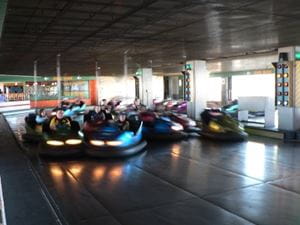

Many of us live lives that have a great deal in common with a bumper car ride. You could say we live a bumper car lifestyle. In the bumper car lifestyle everything seems to be going along fine when suddenly we are hit by an event (large or small) and we are thrown off balance. Or maybe we get locked in the corner, paralyzed for a while. We work hard to get back on track and, poof, almost magically, we are in the groove again; everything is going great, right on plan, we’re doing the driving, we’re doing the scoring, and we think, “Now I am so happy.” We might even become bored or complacent. Then, from an unexpected quarter we take another hit and down we go, and on it goes. Life seems like a perpetual series of highs and lows, unexpected attacks and surprise events. If we stop long enough to check, we find that our lives contain a constant and subtle undercurrent of fear because living the bumper car life style is so unpredictable. We never really know what is going to happen next.
Our response to the unpredictable is to try to make it predictable. We try to control our environment, or the people in it, in ways both subtle and gross. We develop personal strategies for threats real and imagined. We spend much time and energy trying to make our world safe and solid. We engage in ongoing, and often futile, planning. We plan for old age, for sickness, for disaster, weaving our bumper car through the never-ending obstacles. But just when we think everything is under control, we get hit. We lose our job, we break a bone, our child gets sick, we discover our boyfriend has been secretly seeing someone else, or someone close to us dies. The list of possible hits is vast. As long as we are alive there is the possibility of a surprise hit. In the bumper car lifestyle, instead of accepting change (the inevitable) we fear it. We deny its constancy.
The bumper car ride is the perfect metaphor for the unconscious life, the unaware life; the life lived in constant reaction to the world. While many of us remain in the bumper car existence for our entire lives, a few of us find ourselves desiring something different. This desire for change seems to be motivated in a few predicable ways: our bumper car crashes and burns, or it is harried by a seemingly endless series of hits, what Rumi called “all the irritation with the ants.” We might become overwhelmed by our discontent or, maybe, if we are fortunate, someone or something inspires us. Whatever ignites it, the desire for change is the sign that awareness is ready to birth, that it is time to wake up to a deeper more complete reality. In fact, this is the first moment of our awakening. Taking notice of our discontent, admitting that we are not really as “in control” of things as we assumed, becoming aware that, more often than not, we have been “at effect” rather than “at cause” in the story of our life, our head pops out of the sand. The understanding dawns that there is more to life than the bumper car ride, and, with this understanding, the desire for change intensifies. What this “more to life” might be is unknown, but the desire for change is a certainty. This moment of awareness and desire occurs throughout our lives, but unfortunately, it often defines both the beginning and the end of our experience of change. We often stop moving forward right at this point and return to our habitual ways of dealing with the world. Why? In part, it is because we have programmed ourselves to avoid the discomfort that change often requires. It is more natural to seek comfort and pleasure. But another important reason we don’t move on from here is that we simply do not have the skills or the knowledge that allow us to do so. These skills are not taught in our schools; neither did our parents pass them down to us. As Buddhists say, we are simply “ignorant.” This is not a pejorative term. It is not a judgment. In this case, it means that many of us have little or no understanding of awareness; the primary tool for significant change. Yet, awareness is the pathway into the “more” that so many of us seek in life.
Learn more at www.wakinguponline.com.

